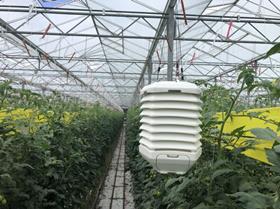
Autogrow has released a public API (Application Programming Interface) allowing connectivity between its Folium sensor network and other farm sensor data.
Jonathan Morgan, chief technology officer of Autogrow, said this move will bring a range of benefits to growers and hopefully encourage more connectivity within the industry.
“Growers currently feel frustrated by not having systems that speak to each other. And the truth is that, until other large industry players also provide public APIs, growers are always going to be constrained in what they can do with their data. But we’re leading the charge,” explained Morgan.
“We know that many growers use CSV exports like Microsoft Excel, which can be slow, labour-intensive and requires a lot of manipulation to get benefit. Connecting systems via the API will give added efficiency to the process and unlock countless possibilities for external development of features and integrations.”
Autogrow first announced its global API solution for indoor growing in July 2017 and Morgan said the company had come a long way since then.
”At that time, we were exploring the possibilities and to spur not only our own research and development team but the industry as a whole. From that point we have advanced into wireless sensor capabilities, Bluetooth connectivity, successful AI-powered tomato yield prediction and cloud-based AWS platform builds; all continuing to give our customers an added advantage in market,” said Morgan.
Ben Popat, product owner and project lead, said APIs are still relatively new in controlled environment agriculture (CEA), but many technology suppliers are starting to see the value, particularly by making them publicly available.
“Public APIs have been available for consumer products for quite a while. A great example would be Google maps where Google gave access to third parties to create thousands of location-based apps using their public API,” noted Popat.
“For our industry, an example would be a developer connecting Folium sensor data using the API to those CSV files but also their Alexa, Siri or Google Assistant. If your temperature in your greenhouse gets too low or too high an alarm could sound in your bedroom or Alexa could play you a song or your Fitbit could sound an alarm. Nothing is impossible.”
Morgan said one of the key benefits of an API for growers is the ability to customise.
“With Folium there could be 50 features you want to add to the platform to work with your business model. We could potentially build 35 of them, but the other 15 is possible through this API for a business to create themselves. Or a third-party wanting to build applications on top of the Folium platform now has the key to be able to do it,” said Morgan.
“From our perspective public APIs are the future of CEA and we’re looking forward to seeing developers utilise both our API and our Folium Sensor Network to push our solution even further.”



